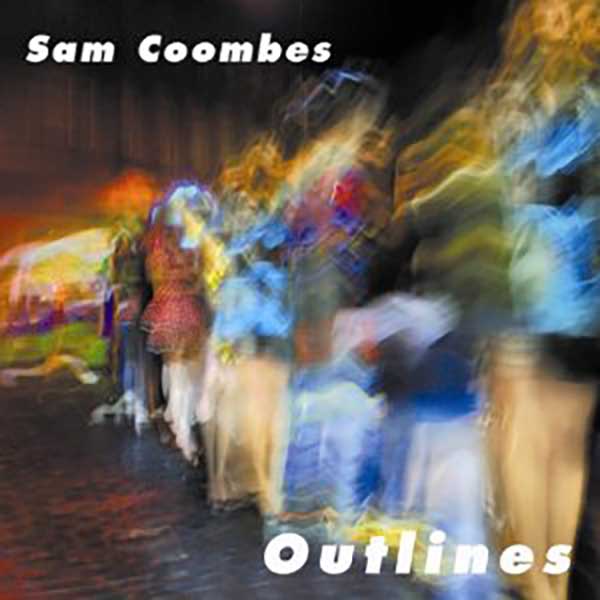
by Ian Mann
July 22, 2011
/ ALBUM
Although "Outlines" doesn't pull up any trees it's the work of an increasingly mature and highly fluent improviser.
Sam Coombes Quartet
“Outlines”
(33 Jazz 33JAZZ218)
British alto saxophonist Sam Coombes is still relatively unknown in his own country. Now based in Edinburgh he spent several years in Paris having completed a degree in philosophy and French and fully immersed himself in the Parisian jazz scene. Coombes co-led an acoustic quartet with another UK expat, pianist Rob Chapman, recording two CDs, the second of which “Static Shock” (Elabeth, 2005) was well received on both sides of the Channel.
Coombes, now thirty five, returned to the UK in 2007 and recorded the music on “Outlines” in 2009. The bulk of the album was recorded in Paris and features his current “French” quartet of Damien Argentieri (piano), Mauro Gargano (double bass) and Antoine Banville (drums). Three of the eleven items feature his Edinburgh based quartet featuring pianist David Patrick, bassist Mario Caribe and drummer Tom Gordon.
“Outlines” is a good showcase for Coombes as both a player and composer. He contributes eight of the album’s eleven tunes with two pieces coming from the pen of bassist Mauro Gargano and with the only outside item being “E.S.P.” by the great Wayne Shorter. Shorter’s tune concludes the album and is the only track to feature Coombes on soprano, otherwise he sticks to alto throughout but describes himself as an “alto player who’s very influenced by tenor players rather than sounding very alto-esque”. There’s certainly something of John Coltrane in Coombes’ fluent, pure toned improvisations but a more modern alto influence might be found in Kenny Garrett.
Much of “Outlines” is in the modern mainstream/post bop vein and Coombes certainly doesn’t try to re-invent the wheel. There is however much to enjoy here, Coombes and pianist Argentieri are both excellent soloists and both are at their best on the urgent opener “Beacons”. Gargano and Banville offer flexible support and both are superb players in their own right. Gargano leads off the twisting, sinuous “Systeme e”, a piece that more closely resembles Coltrane and which features Coombes at his most tenor like. Banville’s performance here, powerful but colourful and intelligent, is excellent throughout.
The title track, recorded with Coombes’ “Scottish” group lowers the temperature, a kind of abstract ballad featuring the composer’s long alto lines above a gently rolling rhythm. Following a brief solo from Patrick the piece concludes with a beautifully controlled passage for solo saxophone.
Gargano’s bop inspired “Drive’n Coffee” is positively hectic with Coombes’ breakneck soloing faithfully shadowed by a highly agile rhythm section. Argentieri’s solo is joyously percussive and the whole thing seems to be over in the blink of an eye.
Coombes seems to prefer the “Scottish” line up for the quieter numbers. The brooding “Giudecca Song” features the lower registers of Coombes’ alto and the resonant growl of Caribe’s bass. Patrick’s sympathetic piano accompaniment glues things together as Gordon adds colour and punctuation from the drums.
“Keep It Steady” increases the tempo again and offers solo opportunities to each member of the group. There’s a lengthy bass excursion from the excellent Gargano, a sparkling solo from Argentieri and a series of colourful drum breaks from Banville plus a typically fluent passage from the leader.
“Invocation”, the last offering from the “Scottish” line-up features keening alto sax above Caribe’s ostinato bass line, Patrick’s sparse piano and Gordon’s hand drums. As the liner notes (by French jazz writer Jean -Marc Gelin) observe there’s something almost tribal or primal about some of the music here, a feeling that persists even throughout Patrick’s piano solo and re-enforces itself with Gordon’s drum feature.
“Push” is a free-wheeling duet for alto and drums with both Coombes and Banville acquitting themselves well. The drummer impresses throughout with his power, intelligence and attention to detail throughout the album.
“Frantime” sees Gargano’s sturdy bass walk and Banville’s chattering brushes underpinning Coombes breezy alto and Argentieri’s slyly percussive piano on one of the album’s most conventionally “jazz” tracks. As Gelin’s liner notes suggest former Dave Brubeck saxophonist Paul Desmond appears to be an influence here.
Gargano’s “Apulia” features fine solos from the composer, Argentieri and Coombes above the busy patter of Banville’s drums.
To close the quartet pay homage to Wayne Shorter,another tenor player interestingly enough, but with Coombes actually playing soprano on the great man’s classic “E.S.P.”.Coombes and his colleagues more than do the tune justice with exuberant solos from both Argentieri at the piano and Coombes on joyously wriggling soprano. Gargano and Banville provide suitably energetic support.
Although “Outlines” doesn’t pull up any trees it’s the work of an increasingly mature and highly fluent improviser. Coombes proves to be an interesting composer too and his two hand picked line-ups serve his tune well, there is some fine playing from both sides of the Channel throughout the album. 33 Records’ customarily high production standards add an extra sheen to a highly competent and enjoyable album. Coombes’ “French” quartet has been touring the UK in support of the album but unfortunately the Cardiff date, which would have been best for me, got pulled. This is a shame as “Outlines” suggests that this line up would be a pretty tasty prospect live.
blog comments powered by Disqus